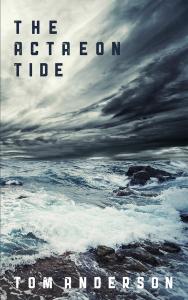 Tom Anderson’s fictional debut novel, The Actaeon Tide, follows on naturally from his previous works – most notably, Chasing Dean. By ‘naturally’ I mean that Anderson’s become known for writing sharp and quirky travelogues focusing on friendships and surfing hotspots around the world, and The Actaeon Tide ensures that the reader knows Anderson’s love for the surf and human relationships is paramount as water, surfing and people work closely together in this novel. The result is an intrinsical, cavernous and mystifying story that manages to weave and solder together ancient myth and modern human life. This combination takes the reader on a joyride through the darkest aspects of our nature to blissful pauses of happiness and contentment to sharp bends where we are inches from falling off the edge and drowning from our own doing.
Tom Anderson’s fictional debut novel, The Actaeon Tide, follows on naturally from his previous works – most notably, Chasing Dean. By ‘naturally’ I mean that Anderson’s become known for writing sharp and quirky travelogues focusing on friendships and surfing hotspots around the world, and The Actaeon Tide ensures that the reader knows Anderson’s love for the surf and human relationships is paramount as water, surfing and people work closely together in this novel. The result is an intrinsical, cavernous and mystifying story that manages to weave and solder together ancient myth and modern human life. This combination takes the reader on a joyride through the darkest aspects of our nature to blissful pauses of happiness and contentment to sharp bends where we are inches from falling off the edge and drowning from our own doing.
The story focuses on the protagonist and enigma, Noah Lloyd, who works as a debt collector and investigator alongside the terrier-like but fatherly figure of Starsky White. From the get-go, we come to learn that we’re being told the story through an informal, first-person technique: ‘The job that changed everything first came onto my radar about a month ago. How do I know it changed everything? You just do, don’t you?’ and that we’re going to be narrated snippets of precise, poetic imagery alongside Noah’s meandering thoughts: ‘…sharp-edged breezes, able to spread the greyness across the town’s walls, pavements and the soaking, dark sand of the seafront a few streets away.’ The first-person that Anderson has employed works incredibly well alongside the poetic descriptions – one moment we’re wading through Noah’s curmudgeon-like stream of consciousness and then, suddenly, we’re whipped back into place with colourful portrayals of the landscape in the South Wales valleys, where the story is set.
The whole premise of the novel is the ambiguity and dread that surrounds Noah and Starksy when they take on an (at first) innocent-looking case from the bewildering and gothic-like Mrs Lovell. This case then grows and morphs into something terrible and perplexing which Noah, Starksy, Alys (a dense, spiritual-medium-like character who is recruited onto the case) and the reader don’t expect. In fact, the case grows its own life (quite literally) and wraps its sinister and interminable fingers around your throat, scaremongering you to read on until Noah and his determination solves what is one of the most baffling and chilling mysteries you’ll ever come across.
Anderson also shows that he has an eye for creating diverse and realistic characters that step out from the pages and embed themselves into your mind long after you’ve put the novel down. The range of characters brush against all features of human nature which, in turn, propels the text into a clever, in-depth analysis of what we are and what we each can become. Noah: brave, determined, petulant; Starky: intelligent, father-like, witty; Alys: mysterious, peculiar, incomprehensible; Mrs Lovell: creepy, paranoid, fearful; and Haydn Greggs: terrifying, domineering and dominant.
Deep proclamations in the text relating to ancient myth are almost riddle-like at times, and you have to really study the dialogue and narration to understand what we’re being told. This could easily put off some readers but the proclamations are punctured and settled down by sharp, realistic dialogue such as: ‘“That’s what you said in the night,” I say.” “What d’you mean?” “It’s not really that essential to you, is it?” she says. “The trust is there anyway.”’ Anderson also helps the reader by effortlessly flickering in strong third-person descriptions: ‘But Noah isn’t in the room. His eyes are on the walls, even of this ten-year-old pub – rough plaster over thick, fake stone; what secrets they might hold?’ This third-person use allows the reader to step back for a moment from the gorging plot; it enables us to think about what is going on and that we can, as Noah also can but doesn’t, step away from this encapsulating and chilling mystery. But, the first-person then swings back in and we’re, once again, walking alongside Noah.
If you fancy picking up a clever, modern thriller tinged with ancient myth that’s full of twists, turns and bite then pick up The Actaeon Tide. But, make sure it doesn’t swallow you up like the unpredictable water that Anderson loves so much because it can, and will, do just that.











